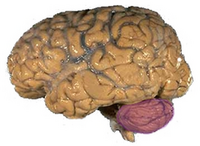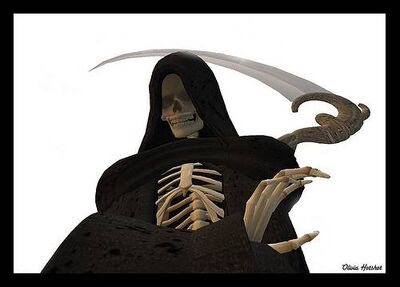Death
 From Conservapedia
From Conservapedia Death is the cessation of biological functions. The nature of death is a matter of debate since most religions have different views on death; however, many involve the concept of the soul and spirit.
The journal article Definitions of death: brain death and what matters in a person published in the Journal of Law and Biosciences states:
| “ | The Commission ultimately recommended a Uniform Determination of Death Act (UDDA) which aimed to make the total brain standard into law in the states. This recommendation has been adopted by the American Bar Association and American Medical Association, and made into law in some form in all 50 states. The UDDA simply states: ’An individual who has sustained either (1) irreversible cessation of circulatory and respiratory functions, or (2) irreversible cessation of all functions of the entire brain, including the brain stem, is dead. A determination of death must be made in accordance with accepted medical standards’. This standard, through (1), incorporates the traditional cardiopulmonary test into the modern definition of death. It is (2) which serves as the ‘sufficient’ definition of death which can address more complex cases. Incorporating the cardiopulmonary test thus allows the traditional medical standards to continue to operate, so that doctors need not do an EEG before issuing a death certificate in every individual case.[1] | ” |
The concept of the afterlife is the most common throughout many religions and many individuals have reported heavenly experiences in near death experiences.[2] The most common view of death throughout many religions is the soul - a version of the deceased which continues to exist in some form after death.
Contents
Personification[edit]
Throughout history, many cultures have possessed their own personification of death. This personification is sometimes known as the Grim Reaper or simply Death, and usually appears wearing a black hooded robe and carrying a scythe. Many religions use a god or deity who stood for death and/or the afterlife:
- Ankou (Breton)
- Hades (Greek)
- Hel (Norse)
- Hun-Came (Mayan)
- Izanami (Shinto)
- Kamatayan (Philippines)
- Loki (Norse)
- Mictlantecuhtli (Aztec)
- The Morrigan (Irish)
- Mors (Roman)
- Mot (Canaanite)
- Odin (Norse)
- Osiris (Egyptian)
- Shemal (Semitic)
- Shinigami (Japanese)
- Sielulintu, Kalma, Surma (Finnish)
- Thanatos (Greek)
- Tuoni (Finnish)
- Yama (Hindu)
- Yanluo (Chinese)
See Revelation, Book of (historical exegesis).
Medical Definitions[edit]
In medicine, when a person has lost their pulse, that is considered clinical death. After clinical death, assuming the heart is not restarted, the cells will enter apostasy, or cellular death, which is irreversible. Finally, there is chemical death, where the body returns to the basic components via decomposition
Religious Interpretations[edit]
Many religious people, including Christians, believe only their bodies die, not their souls. They believe they have everlasting life in either Heaven or Hell once their corporeal life has ended. Other Christians believe that the noncorporeal soul may remain with the body until the day of Christ's return.[3] Some writers characterize this state as "soul sleep".
Not that any man hath seen the Father, save he which is of God, he hath seen the Father.
Verily, verily, I say unto you, He that believeth on me hath everlasting life. I am that bread of life.
- John 5:46-48 King James Version
Other religions, such as Paganism or Hinduism, believe in reincarnation, the transmigration of the soul after death into a new body.
Most atheists have a rather nihilistic concept of death usually seeing it as the end of their existence.
Atheism and death[edit]
See also: Atheism and death and Atheism and death anxiety
See also[edit]
Further reading[edit]
Essay: Did God Truly Die? (conservapedia.com)
References[edit]
- ↑ Definitions of death: brain death and what matters in a person by Ben Sarbey, J Law Biosci. 2016 Dec; 3(3): 743–752.
- ↑ True Near Death Experiences (bibleprobe.com)
- ↑ Our Redeemer Lutheran Church - 2019 Sermons. June 09 Pentecost. Revelation 21 (orlutheran.com) audio sermon 190609
Categories: [Biology] [Religion] [Culture] [Philosophy] [Human Development]
↧ Download as ZWI file | Last modified: 03/04/2023 14:28:34 | 210 views
☰ Source: https://www.conservapedia.com/Death | License: CC BY-SA 3.0
 ZWI signed:
ZWI signed:

 KSF
KSF